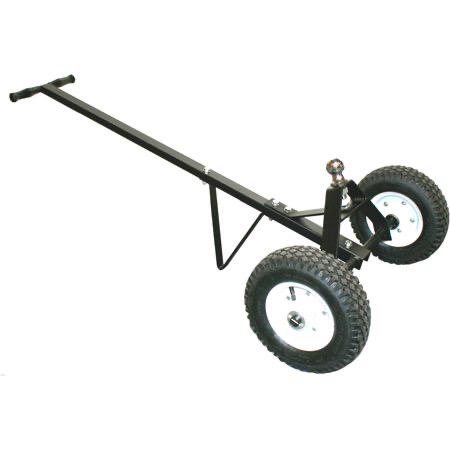My dual-axle car trailer always was unpleasant to push by hand. OK, so it doesn't have a jack wheel but even with the jack retracted off the ground I pretty much can't maneouvre it around.
Which made me wonder - as it has electric trailer brakes, do are these normally "on" when there is no power to the brakes, or "off"? If they're on by default like air brakes are, that would explain why I have a hard time pushing the trailer. If they're off, I need to go to the gym more.
They are off.
They are magnets that when energized attempt to grab onto the spinning brake drum. This pulls an arm that the magnet is attached to that actuated the friction surface to push against the drum.
Interesting point with these is that even if they were electrically active, they can't hold a trailer in place. They require the drum movement to engage the brake.
All that being said, if you have a battery on your trailer and you pull the cable for the emergency disconnect, it will try to apply the brakes. It will initially roll, but then the brakes will grab.
Thanks. Guess I need to either go to the gym or figure out if there is anything else stopping the trailer from moving. Or both  .
.
wvumtnbkr said:
They are off.
They are magnets that when energized attempt to grab onto the spinning brake drum. This pulls an arm that the magnet is attached to that actuated the friction surface to push against the drum.
Interesting point with these is that even if they were electrically active, they can't hold a trailer in place. They require the drum movement to engage the brake.
And they also do not work in reverse.
It seems like you'd want them to operate like a tractor trailer rig, right?
Where if the air lines are disconnected/break/etc, it locks the brakes.
As above, if you have a battery, brakes will apply.
No electricity, no brakes.

imgon
HalfDork
1/23/20 6:25 p.m.
Moving a dual axle trailer is very hard if you are going in a straight line. I have found it nearly impossible to move by yourself if you need to turn it, too much friction/tension with the 4 wheels to rotate. If you need to keep it from moving while parked, get a set of wheel chocks.

Dave M
HalfDork
1/23/20 8:19 p.m.
*Magnets*
(Insert Insane Clown Possee joke from 15 years ago here)
z31maniac said:
It seems like you'd want them to operate like a tractor trailer rig, right?
Where if the air lines are disconnected/break/etc, it locks the brakes.
The problem is, show how you can do that with an electric device, that can operate at current levels lower than ten amps at twelve volts (the pretty much "standard" for electric trailer brakes), that does not require battery power or any kind of controller device on the trailer.
Air brakes apply with lack of air because it's easy to do it that way. Air is a lot easier to work with power wise compared to electricity.
z31maniac said:
It seems like you'd want them to operate like a tractor trailer rig, right?
Where if the air lines are disconnected/break/etc, it locks the brakes.
That's what the breakaway switch is for. I often see them connected wrong but what's supposed to happen is the cable is short enough that if the coupler comes off the ball the pin is pulled, the brakes lock up and the tongue gets cradled by the crossed safety chains.

codrus
UberDork
1/23/20 9:43 p.m.
Knurled. said:
The problem is, show how you can do that with an electric device, that can operate at current levels lower than ten amps at twelve volts (the pretty much "standard" for electric trailer brakes), that does not require battery power or any kind of controller device on the trailer.
In theory you could reverse it -- use a permanent magnet to pull the brake shoe in contact with the drum and then an electromagnet to counteract it.
The problem with this is that the electromagnet gets a lot of assistance from the self-energizing wedging effect of the drum brakes and that's not going to happen when the vehicle is stopped. So now you'd need a much bigger permanent magnet, which means a much bigger electromagnet, with a lot more juice to run it.
And really there's not much point. The current system is simple and cheap and works fine.

pirate
HalfDork
1/24/20 7:46 a.m.
Not related to the electric brakes but I finally bought a trailer dolly for moving trailers around. I have a small car trailer and also a car dolly we use with a motorhome. The whole thing of not having to lift on the tongue while trying to pull or push makes moving the trailer around much easier.

imgon said:
Moving a dual axle trailer is very hard if you are going in a straight line. I have found it nearly impossible to move by yourself if you need to turn it, too much friction/tension with the 4 wheels to rotate. If you need to keep it from moving while parked, get a set of wheel chocks.
Interesting.
The background for the question is actually that I'm thinking about putting it in a different parking sport - right now it's parked on grass, but I have a tarmac parking bay I could put it into. Problem is that to get there, I either have to drive over our septic leach field (oops, no). or maneouver the trailer in by hand for the last few yards as the area in front of the hard standing isn't large enough to turn truck and trailer around.

java230
UberDork
1/24/20 12:34 p.m.
In reply to BoxheadTim :
Hes very correct, straight line, much easier, any turn and your fighting the tires on the ground. Gravel or grass (low friction) will be easier to turn, but you have to remember the turning radius is the center line between the axles, your always scrubbing the tires with two axles.
I have this issue too, I cant get my boat into the garage with the truck, its a tight 90degree turn and I dont have swing room for the truck. So I do it by hand. The little dolly posed above (HF) is great, I have one too.
I'll definitely look into the dolly then. I was planning to get a wheel for the trailer jack as it currently only has a plate on it, in the hope that that would help.
I actually have problems pushing the trailer back in a straight line on grass, not even when trying to turn it.

Mr_Asa
Reader
1/24/20 12:55 p.m.
BoxheadTim said:
I actually have problems pushing the trailer back in a straight line on grass, not even when trying to turn it.
Something could still be binding up in the system. Are the bearings good? Maybe the shoes are dragging on the drums?
Mr_Asa said:
BoxheadTim said:
I actually have problems pushing the trailer back in a straight line on grass, not even when trying to turn it.
Something could still be binding up in the system. Are the bearings good? Maybe the shoes are dragging on the drums?
Trailer is two years old, maybe 2 1/2 and has had the bearings serviced about 700-800 miles ago.
Tandem trailers are a PAIN in the ass to move by hand. They will sometimes roll forward and backward, you will NOT be able to turn them because one set of tires has to slide sideways.
Sometimes a front hitch can help with stowing the trailer.
I always wondered why they don't have parking brakes on trailers. Sure would be nice to pull into a spot and not have to chock wheels before unhitching.
In reply to Curtis73 :
Actually in Europe, a lot of them do, but they don't use electric trailer brakes much either. They're usually rod actuate via the hitch (basically your tow vehicle brakes, inertia of the trailer pushes against the hitch, hitch connector compresses and actuates the brakes).

codrus
UberDork
1/24/20 10:26 p.m.
BoxheadTim said:
In reply to Curtis73 :
Actually in Europe, a lot of them do, but they don't use electric trailer brakes much either. They're usually rod actuate via the hitch (basically your tow vehicle brakes, inertia of the trailer pushes against the hitch, hitch connector compresses and actuates the brakes).
Sounds like surge brakes, which people on this board pretty much universally hate. :) Good at surviving getting dunked at the boat ramp, but that's about it.

ChasH
Reader
1/24/20 11:17 p.m.
Surge brakes are much better than no brakes, but electric brakes are better than surge brakes even if it's just because of the driver operable separate brake control. I've seen a number of trailers in Europe with a handle for what appears to be a parking brake.
I put a ball on the back of my lawn tractor so I can use my road going utility trailer around the homestead. And I put a hitch on my engine hoist so I can tow it around with the tractor.






































